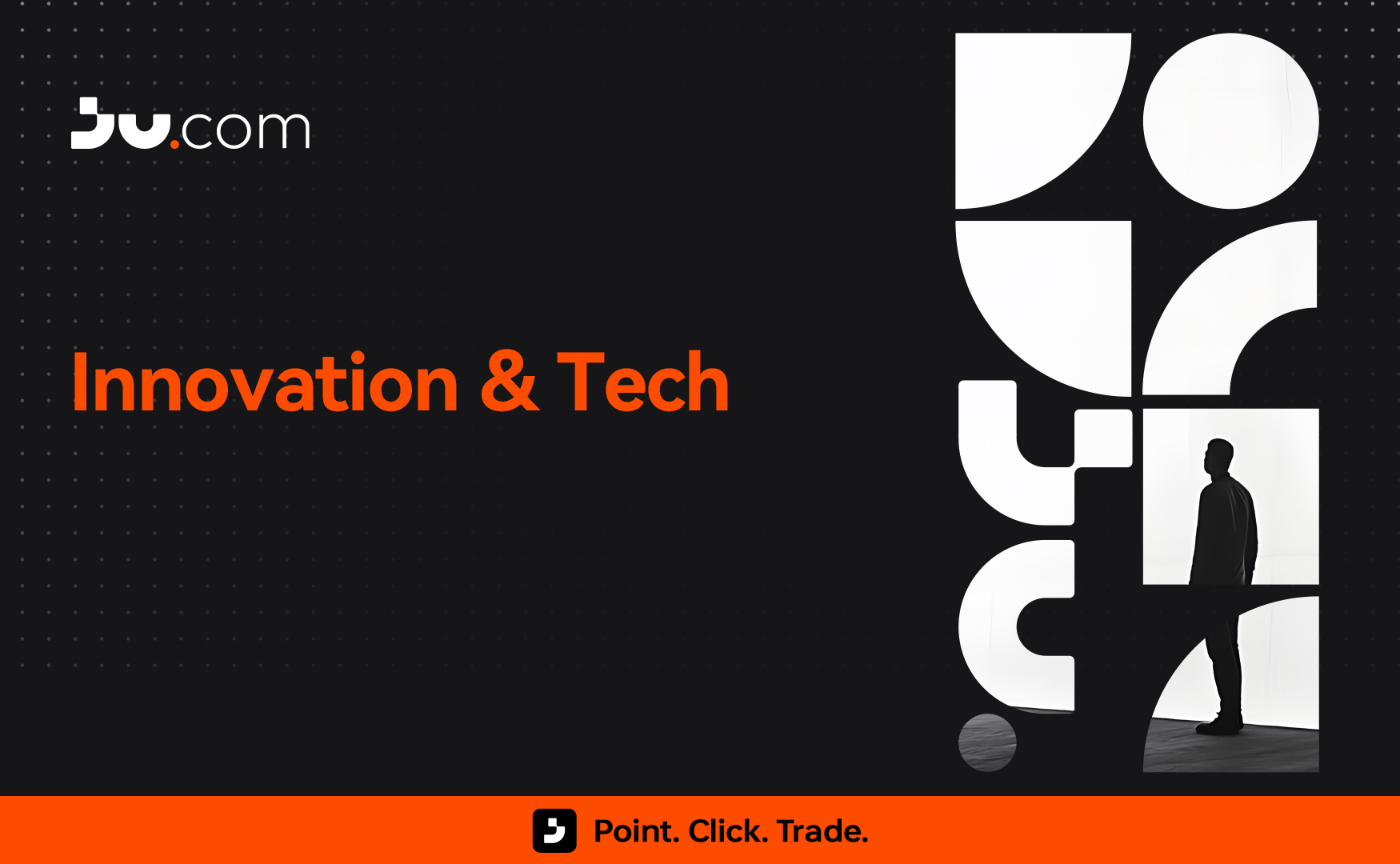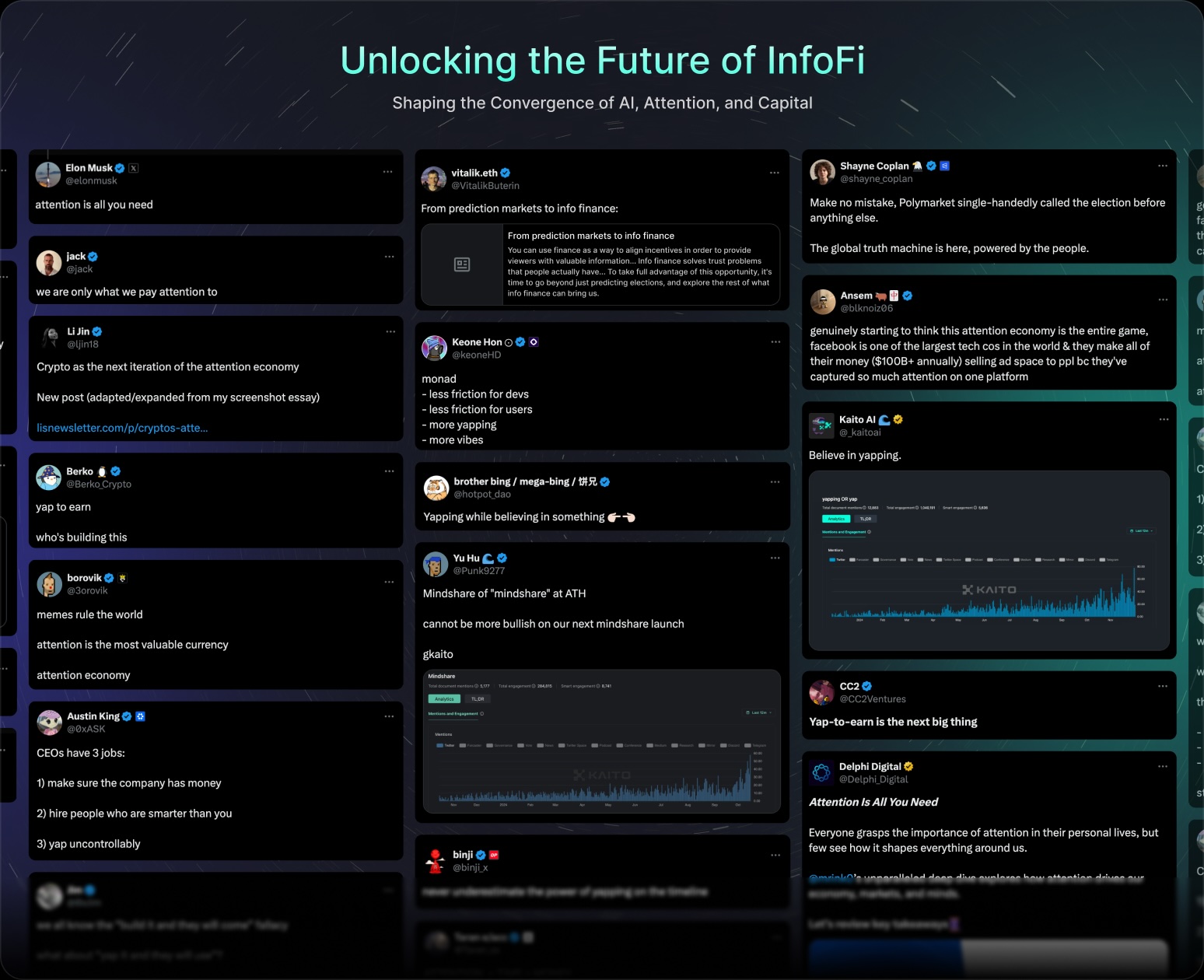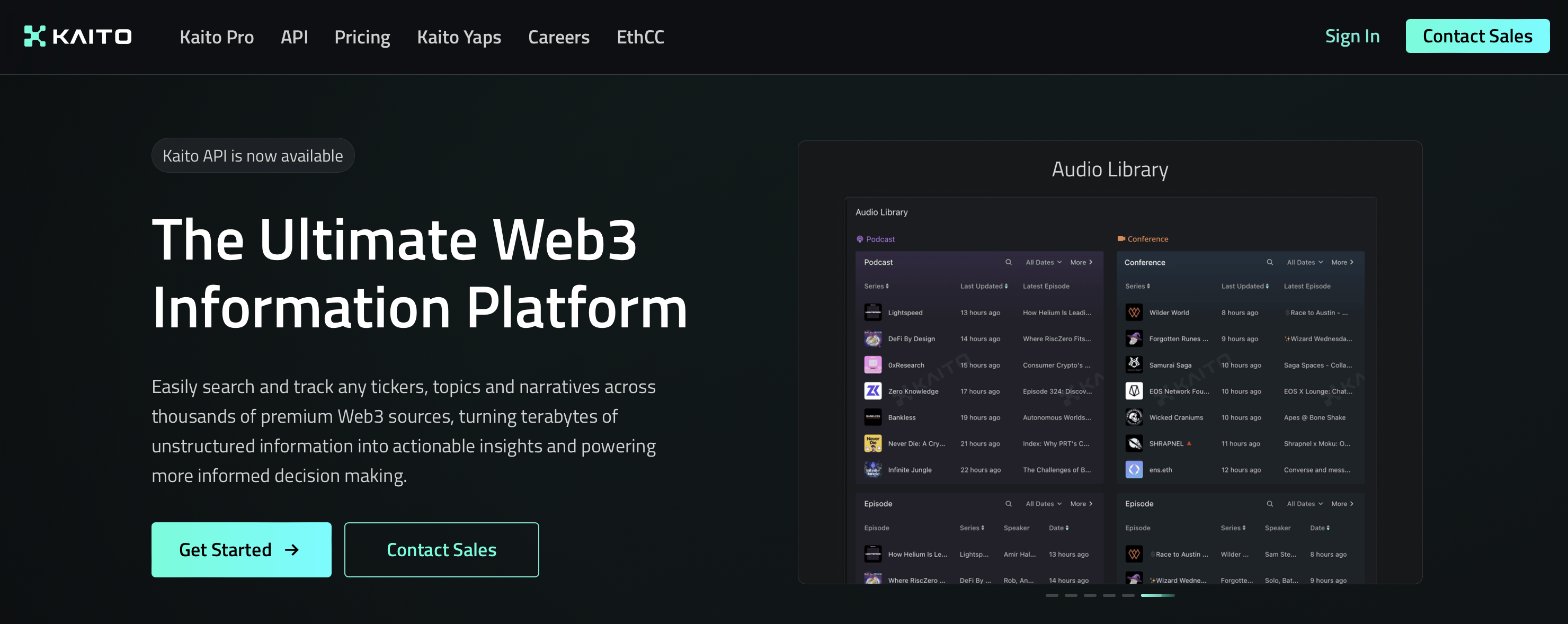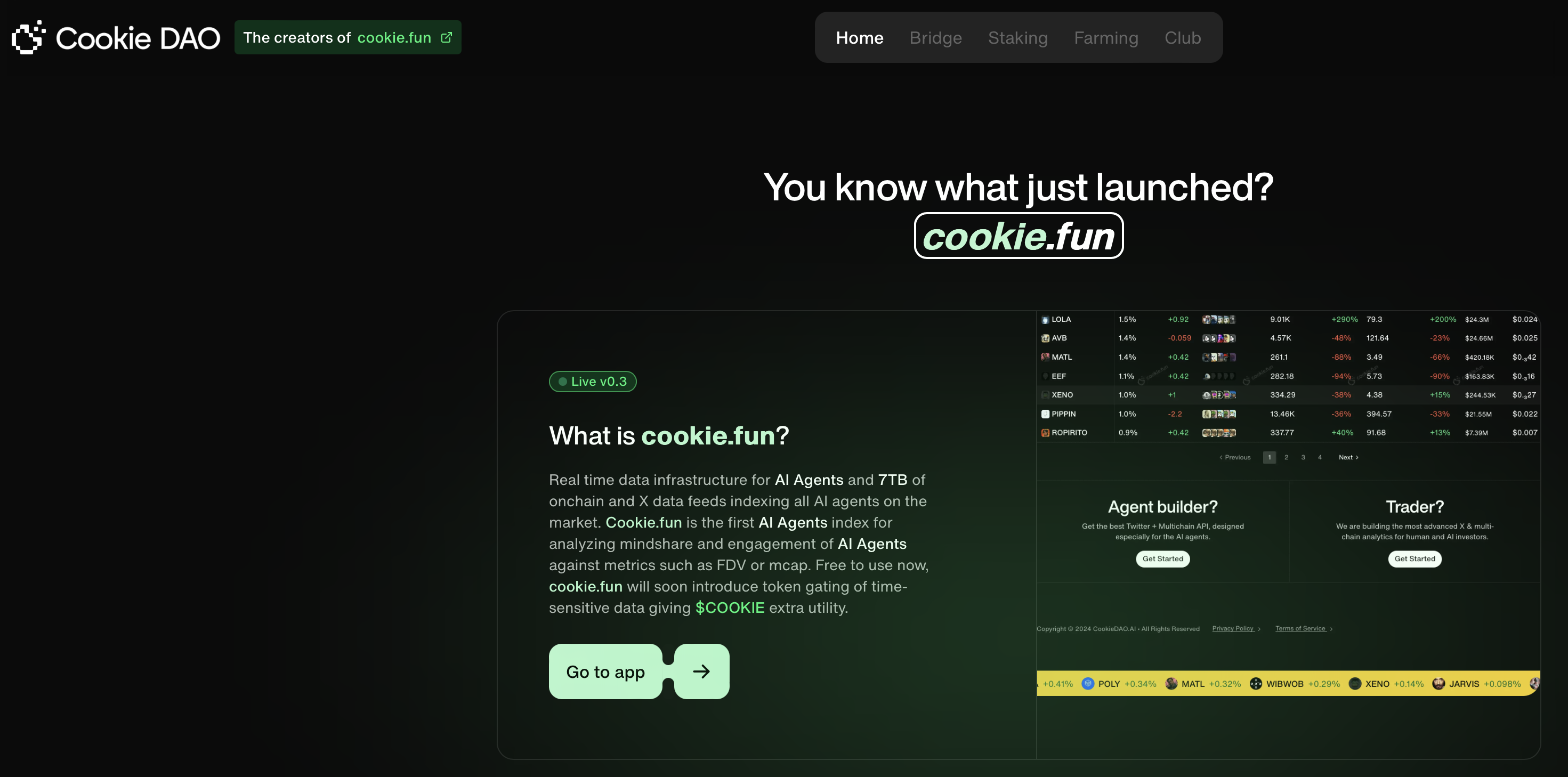
Key Takeaways
- InfoFi transforms information into tradable assets, leveraging blockchain and AI to create equitable value distribution in the cryptocurrency ecosystem.
- Leading platforms like Kaito use advanced analytics to aggregate and process Web3 data, addressing information fragmentation for traders and investors.
- Tokenization in InfoFi, exemplified by systems like Kaito’s Yaps, incentivizes quality content creation and aligns economic incentives across participants.
- The InfoFi market, valued at $649 million, demonstrates strong growth potential through innovative platforms and token-driven ecosystems.
- InfoFi’s success relies on scaling blockchain and AI technologies to reshape global information economies with transparency and fairness.
The cryptocurrency landscape has experienced a transformative shift with the rise of Information Finance, or InfoFi, a pioneering sector that redefines how information and attention are valued, traded, and monetized within decentralized ecosystems. This emerging field marks a significant departure from traditional attention economies controlled by centralized platforms, moving toward a tokenized system where market forces determine the value of information, and participants are fairly compensated for their contributions. By integrating blockchain technology with advanced artificial intelligence, InfoFi establishes a new paradigm for information economics, prioritizing transparency, quality, and equitable value distribution.
This Innovation and Tech article explores how InfoFi is transforming information into a tradable, tokenized asset class through the convergence of blockchain and AI. By spotlighting platforms like Kaito and the emerging market for attention-based token economies, it examines how InfoFi is reshaping data monetization, incentivized content creation, and decentralized information governance in the Web3 era.
Core Concepts & Market Foundation
InfoFi fundamentally reshapes the dynamics among information producers, consumers, and platforms by converting attention into liquid financial assets. Unlike traditional social media platforms, where value primarily benefits platform owners, InfoFi facilitates direct value exchange among all participants through tokenization. This approach tackles the longstanding issue of user data and attention exploitation by Big Tech, fostering a more equitable distribution of economic benefits derived from information exchange. By treating attention as a scarce and valuable resource, InfoFi aligns incentives to reward meaningful contributions over superficial engagement.
The sector’s foundation lies in recognizing attention as the most critical commodity in an era where artificial intelligence has significantly lowered the cost of information production. With information abundance growing, the challenge has shifted from creating content to curating valuable insights that capture users’ limited attention spans. InfoFi platforms harness blockchain technology and artificial intelligence to build transparent, efficient systems where the quality and relevance of information drive economic value, moving away from algorithmic manipulation prevalent in centralized systems. This shift empowers users to prioritize trustworthy and influential content, fostering a marketplace where high-quality information thrives.
At its essence, InfoFi represents the financialization of information flows, transforming data from a mere communication tool into tradable assets with measurable market value. This transformation unlocks innovative business models where quality, trustworthiness, and influence determine value, while irrelevant or low-quality content loses economic viability. By establishing a decentralized framework for valuing information, InfoFi creates opportunities for creators, consumers, and platforms to engage in a mutually beneficial ecosystem, redefining the economics of attention in the digital age.
Market Landscape & Leading Platforms

The InfoFi sector currently holds a substantial market capitalization of approximately $649 million, reflecting strong investor confidence and significant growth potential. Kaito stands as the leading platform in this space, generating an impressive annual revenue of $33 million through its advanced data analytics platform and subscription services. Founded by former Citadel portfolio manager Yu Hu, Kaito has attracted $10.8 million in funding from prominent institutions, including Dragonfly, Sequoia Capital China, and Spartan Group, underscoring its pivotal role in shaping the InfoFi ecosystem.
Kaito’s platform addresses the critical issue of information fragmentation in the cryptocurrency space by indexing thousands of premium Web3 sources, such as decentralized finance protocols, blockchain research papers, and community-driven forums, which are often inaccessible through traditional search engines. By combining cutting-edge large language models with comprehensive data aggregation, Kaito transforms vast amounts of unstructured information into searchable, actionable insights. This capability serves a diverse user base, including traders, AI agent companies, investment funds, and blockchain developers, all of whom rely on accurate sentiment tracking and real-time market intelligence to make informed decisions.

Beyond Kaito, other platforms like Cookie DAO and those focused on creator incentives and community governance contribute to the InfoFi ecosystem. These platforms emphasize decentralized mechanisms for validating information, allocating attention, and distributing value, offering a democratic alternative to traditional centralized systems. By fostering collaboration and rewarding high-quality contributions, these platforms strengthen the InfoFi market, creating a robust network of tools and services that cater to the evolving needs of cryptocurrency participants.

Technology Infrastructure & Implementation
InfoFi platforms rely on sophisticated technological architectures that integrate blockchain infrastructure, artificial intelligence, and advanced data processing capabilities. Kaito’s system, for instance, automatically crawls and indexes cryptocurrency-related information from diverse sources, including social media platforms, governance forums, research reports, podcasts, and meeting records. This comprehensive data collection creates a unified information ecosystem, eliminating the need for users to navigate multiple fragmented platforms and providing a seamless experience for accessing high-quality insights.
The artificial intelligence capabilities of InfoFi platforms extend far beyond basic data aggregation. Kaito employs large language models to perform advanced content analysis, extract meaningful insights, filter out irrelevant noise, and rank information based on relevance. These AI systems understand context, analyze sentiment, and identify emerging trends, delivering processed intelligence rather than raw data. This approach marks a significant advancement over traditional search engines, which often index content without grasping its deeper meaning or relevance to users’ needs. By prioritizing actionable insights, InfoFi platforms enhance decision-making for users across the cryptocurrency ecosystem.
Kaito’s innovative Yaps system exemplifies how InfoFi platforms tokenize attention and incentivize quality content creation. Users earn Yap points by sharing valuable cryptocurrency insights on social media, with these points serving as tokenized representations of community recognition and content value. This mechanism not only rewards creators but also establishes measurable standards for information quality within the ecosystem. By integrating such systems, InfoFi platforms create dynamic feedback loops that enhance content relevance and foster active participation, further solidifying their role in the decentralized information economy.
Economic Models & Token Mechanisms
The economic foundation of InfoFi rests on sophisticated tokenomics designed to align incentives across all ecosystem participants. Kaito’s native token, KAITO, serves multiple purposes, including facilitating network transactions, driving market dynamics, and enabling community governance. With a total supply of one billion units, the token follows a structured distribution model that allocates significant portions to ecosystem development, creator incentives, and community governance, ensuring long-term sustainability and engagement.
Token holders play an active role in shaping the InfoFi ecosystem by influencing attention distribution within the AI-powered platform. This governance mechanism ensures that network evolution aligns with community interests, maintaining transparency and efficiency. The staking mechanism further encourages long-term participation by granting voting rights, incentivizing users to hold tokens and engage actively in platform governance. These structures create a balanced ecosystem where economic incentives drive quality content creation and meaningful interaction, moving beyond short-term speculative trading.
The tokenization model of InfoFi also enables new economic opportunities, such as microtransactions for high-quality insights and decentralized marketplaces for information trading. By assigning tangible value to attention and information, InfoFi platforms empower creators to monetize their expertise directly, while consumers gain access to curated, reliable data. This economic framework positions InfoFi as a transformative force in the cryptocurrency ecosystem, fostering innovation and collaboration across decentralized networks.
InfoFi’s Vision For A Decentralized Information Economy

InfoFi represents a profound transformation in how information economies function, offering a decentralized alternative to traditional attention-based business models dominated by centralized platforms. Through innovative tokenization mechanisms and AI-powered curation systems, InfoFi ensures equitable value distribution while enhancing information quality and accessibility. The sector’s current market capitalization of $649 million, coupled with the technological advancements of platforms like Kaito, underscores its strong growth potential as blockchain infrastructure continues to mature.
The success of InfoFi will hinge on its ability to scale technological capabilities and deliver real-world utility to a global audience. As platforms like Kaito expand their offerings, integrating advanced AI and blockchain solutions, InfoFi is poised to become a cornerstone of the global information economy. By redefining how societies value, trade, and benefit from information exchange, InfoFi offers a forward-looking vision for a transparent, equitable, and decentralized digital age.





